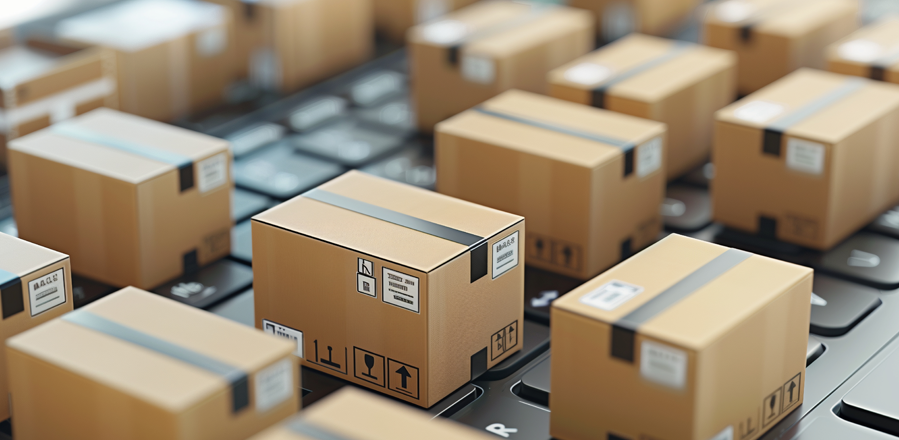The exponential growth of e-commerce has transformed the landscape of parcel shipping. As consumers increasingly turn to online platforms for their purchasing needs, the demand for efficient, reliable, and cost-effective parcel shipping solutions has surged. This paradigm shift presents both opportunities and challenges for parcel carriers, fulfillment centers, and online retailers. The interplay between technological advancements, consumer behavior, and logistical innovations is reshaping how goods are transported from sellers to buyers.
The rapid evolution of e-commerce has not only expanded market reach but also intensified competition among businesses. This has led to a race for faster delivery times, better service quality, and more sustainable practices. Understanding the impact of these changes is crucial for stakeholders across the supply chain to stay competitive and meet the rising expectations of modern consumers.
The Rise of E-Commerce and Its Implications for Parcel Shipping
Exponential Growth of E-Commerce
E-commerce has witnessed unprecedented growth over the past decade. According to eMarketer, global e-commerce sales are projected to reach $6.38 trillion by 2024. This surge is driven by advancements in technology, increased internet penetration, and changing consumer behaviors. As a result, the volume of parcels being shipped has skyrocketed, necessitating robust and scalable shipping solutions.
The widespread use of smartphones and mobile apps has made online shopping more convenient than ever. This has led to a surge in e-commerce growth, as consumers can now buy products from anywhere and at any time. However, this convenience has also resulted in a substantial increase in the daily volume of packages being shipped, which is putting pressure on shipping infrastructures to meet the demand.
Consumer Expectations and the Need for Speed
Modern consumers have heightened expectations when it comes to delivery speed. The rise of giants like Amazon has set a new standard for expedited parcel shipping, with same-day and next-day delivery becoming increasingly common. This expectation for rapid delivery has put immense pressure on parcel carriers and fulfillment centers to optimize their operations and ensure timely deliveries.
In addition to speed, consumers also expect accurate tracking and timely notifications about their parcels. Meeting these expectations requires sophisticated logistics and real-time data management systems. Parcel carriers must continually innovate and invest in technology to meet these demands and maintain customer satisfaction.
Challenges Faced by Parcel Carriers
Handling Increased Volume
Managing the increased parcel volume while maintaining service quality is a significant challenge for parcel carriers like USPS, FedEx, UPS, and DHL. It necessitates substantial investments in infrastructure, technology, and workforce to effectively address the logistical challenges brought about by the surge in e-commerce.
To handle the growing volume, carriers are expanding their sorting facilities and upgrading their fleets. This expansion is not without its challenges, as it involves significant capital expenditure and operational adjustments. Moreover, ensuring that these investments translate into improved service quality and efficiency is a continuous process.
Cross-Border Shipping Complexities
International parcel shipping presents its own set of challenges. Navigating customs regulations, managing cross-border taxes and duties, and ensuring timely delivery can be complex and resource-intensive. E-commerce shipping companies must develop robust strategies to handle these complexities efficiently.
Differences in regulatory requirements across countries add another layer of complexity. Parcel carriers must stay informed about changes in international trade policies and adapt their operations accordingly. Effective cross-border shipping also involves managing partnerships with local carriers to ensure seamless delivery.
Last-Mile Delivery
Last-mile delivery is often the most challenging and expensive part of the shipping process. As parcels make their way from distribution centers to the final destination, factors such as traffic, route optimization, and delivery density come into play. Parcel carriers must innovate and invest in technology to streamline last-mile delivery and meet consumer expectations.
Innovations such as crowd-sourced delivery and local delivery hubs are being explored to enhance last-mile efficiency. Additionally, real-time tracking and dynamic routing algorithms help in optimizing delivery routes and reducing delays. These solutions not only improve customer satisfaction but also contribute to cost savings for carriers.

Strategies for Retailers and E-Commerce Businesses
Partnering with Reliable Parcel Carriers
For e-commerce businesses, partnering with reputable parcel carriers is crucial. Companies like USPS, FedEx, UPS, and DHL offer a range of shipping options, including express shipping and international parcel delivery. By leveraging the expertise and infrastructure of these carriers, businesses can ensure reliable and timely deliveries.
Selecting the right carrier involves evaluating factors such as delivery speed, coverage area, and cost. Establishing strong relationships with multiple carriers can provide flexibility and mitigate risks associated with carrier-specific issues. Regular performance reviews and open communication channels are essential for maintaining these partnerships.
Optimizing Packaging and Dimensional Weight
Packaging plays a significant role in parcel shipping costs. E-commerce businesses must optimize their packaging to minimize dimensional weight and reduce shipping expenses. This involves selecting appropriate packaging materials and sizes, as well as adopting sustainable packaging practices.
Efficient packaging not only reduces costs but also enhances the customer experience by ensuring that products arrive undamaged. Businesses can also explore innovative packaging solutions, such as reusable containers, to further reduce their environmental impact. Educating customers on proper packaging disposal and recycling practices contributes to sustainability efforts.
Enhancing Fulfillment Center Operations
Efficient fulfillment center operations are essential for meeting consumer expectations. Businesses should invest in advanced warehouse management systems (WMS) and inventory management solutions to streamline order processing and reduce lead times. Additionally, implementing robust quality control measures ensures accurate and damage-free shipments.
Automation and real-time data analytics can significantly enhance the efficiency of fulfillment centers. By integrating these technologies, businesses can achieve higher order accuracy and faster processing times. Continuous improvement initiatives, such as lean management practices, further contribute to operational excellence.
Offering Flexible Shipping Options
Consumers value flexibility in shipping options. Offering a range of delivery speeds, such as same-day, next-day, and standard shipping, allows customers to choose the option that best suits their needs. Providing accurate delivery estimates and transparent pricing further enhances the customer experience.
Personalized delivery options, such as scheduled delivery windows and alternative pickup locations, add another layer of convenience. Implementing a seamless returns process also contributes to a positive customer experience. Businesses should regularly review and update their shipping policies to align with evolving consumer preferences.
Technological Innovations in Parcel Shipping
Parcel Tracking and Visibility
Parcel tracking has become a critical component of the shipping experience. Consumers expect real-time updates on the status and location of their parcels. Advanced tracking technologies, such as GPS and RFID, provide enhanced visibility and enable proactive communication with customers.
Enhanced tracking capabilities also allow carriers to identify and address potential issues before they impact delivery timelines. This proactive approach can significantly reduce instances of lost or delayed parcels, thereby improving overall service reliability. Additionally, integrating tracking systems with customer service platforms allows for more efficient handling of inquiries and complaints.
The Future of Parcel Shipping
Sustainability and Green Shipping Initiatives
Sustainability is becoming a key consideration in parcel shipping. Consumers are increasingly conscious of the environmental impact of their purchases and expect businesses to adopt green shipping practices. Parcel carriers and e-commerce businesses are exploring eco-friendly packaging materials, carbon-neutral shipping options, and electric delivery vehicles to reduce their carbon footprint.
Investing in renewable energy sources and optimizing delivery routes to reduce emissions are also part of green shipping strategies. Collaborating with environmentally focused organizations can further enhance sustainability efforts. Transparency in reporting environmental impact and progress towards sustainability goals builds consumer trust and loyalty.
Integration of Emerging Technologies
Emerging technologies, such as blockchain and drones, hold significant potential for transforming parcel shipping. Blockchain can enhance transparency and security in the supply chain, while drones can revolutionize last-mile delivery by providing faster and more efficient transportation of parcels.
Blockchain technology ensures the integrity and traceability of transactions, reducing the risk of fraud and errors. Drones, on the other hand, can navigate congested urban areas and remote locations with ease, offering a viable solution for fast and reliable deliveries. The integration of these technologies requires regulatory support and significant investment but promises substantial benefits.
Parcel Tracking and Visibility
Parcel tracking has become a critical component of the shipping experience. Consumers expect real-time updates on the status and location of their parcels. Advanced tracking technologies, such as GPS and RFID, provide enhanced visibility and enable proactive communication with customers.
Enhanced tracking capabilities also allow carriers to identify and address potential issues before they impact delivery timelines. This proactive approach can significantly reduce instances of lost or delayed parcels, thereby improving overall service reliability. Additionally, integrating tracking systems with customer service platforms allows for more efficient handling of inquiries and complaints.
Collaboration and Industry Partnerships
Collaboration between parcel carriers, e-commerce businesses, and technology providers is essential for driving innovation and addressing industry challenges. By forming strategic partnerships, companies can leverage each other's strengths and create integrated solutions that enhance the overall shipping experience.
Collaborative efforts can lead to the development of industry standards and best practices that benefit all parties involved. Joint investments in research and development accelerate the adoption of new technologies and solutions. Open communication and shared goals are key to successful collaborations.

Jillamy’s Fulfillment Services: Boosting Nationwide and International Parcel Shipping
As e-commerce grows, Jillamy’s fulfillment services play a key role in supporting nationwide and international parcel shipping. Our solutions integrate seamlessly with e-commerce platforms to ensure timely and accurate deliveries.
Nationwide Fulfillment Centers
Jillamy optimizes fulfillment centers with advanced warehouse management and real-time data analytics, ensuring precise inventory management and faster parcel shipping.
Packaging and Kitting
Our expert packaging and kitting services reduce shipping costs and protect products in transit, enhancing the overall customer experience.
Last-Mile Delivery
Jillamy’s last-mile solutions use innovative technologies and local partnerships to optimize delivery routes, ensuring parcels arrive on time with flexible delivery options.
International Shipping
Jillamy simplifies international parcel shipping by managing customs, cross-border taxes, and global logistics, helping businesses expand their reach.
Partner with Jillamy to streamline your e-commerce operations and achieve efficient, customer-focused parcel shipping both nationwide and internationally.
Conclusion
The impact of e-commerce on parcel shipping is profound and far-reaching. As the volume of online purchases continues to grow, parcel carriers, fulfillment centers, and retailers must adapt to meet evolving consumer expectations. By embracing technological innovations, optimizing operations, and prioritizing sustainability, businesses can navigate the complexities of parcel shipping and deliver exceptional customer experiences. The future of parcel shipping lies in collaboration, innovation, and a commitment to meeting the needs of the modern consumer.
As the industry continues to evolve, staying ahead of trends and continuously improving processes will be essential. The integration of emerging technologies and sustainable practices will shape the future landscape of parcel shipping. Businesses that prioritize customer satisfaction, efficiency, and environmental responsibility will lead the way in this dynamic and rapidly changing market. By staying adaptable and investing in the right strategies and technologies, companies can position themselves for success in the evolving world of e-commerce-driven parcel shipping.
Contact Jillamy to learn how our comprehensive parcel shipping solutions can help your business thrive in this competitive environment.


